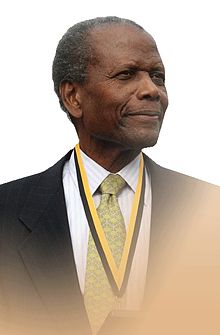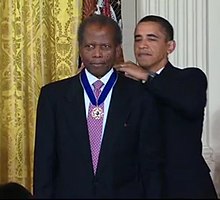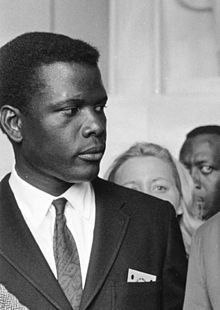Sidney Poitier
Appearance

And if we can't and don't, then it is enough to rejoice in our short time here and to remember how much we loved the view.
Sidney Poitier (20 February 1927 - 7 January 2022) was an Academy award-winning Bahamian-American actor, director, author and diplomat.
| This article about an actor is a stub. You can help out with Wikiquote by expanding it! |
Quotes
[edit]

- The older we get the less afraid we are.
- As quoted in interview with AARP The Magazine (September/October 2008)
- I would like to grow less afraid of dying. I am infinitely less afraid today than I was 15 or 25 years ago. I was most afraid of dying when I was 33, because I come from a Catholic family.
- If you are anxious about death, then you don't have a sense of the oneness of things—you feel that after death, you will be no more.
- "Oprah Talks to Sidney Poitier", O Magazine (October 2000)
The Measure of a Man (2000)
[edit]- The Measure of a Man : A Spiritual Autobiography
- When you’re addressing power, don’t expect it to crumble willingly. If you’re going to say, "Hey now, look you guys, please look at what you did and look at yourselves and punish yourselves and at least try to square this thing, right?"— well, you’ll make slower progress at that than you would expect. I mean, even the most modest expectations are going to be unfulfilled.
Think about it. Today there are still people all over the world who maintain that the Holocaust didn’t happen. There are people in the United States — people among that power echelon we speak of — who maintain that all slaves were happy. There are those power symbols that always say, "Well, it was for the good of the states. It was for the cohesion of the political process." There are myriad justifications for denial.
There are also people who say, "Hey, after thirty years of affirmative action, they’ve got it made. Black people — it’s their own fault if they can’t make it today."
Yeah, well, of course they say that. And they say it not just about black people. They say it in every country. We did something for you people, whoever "you" are. And we think that’s quite enough now.
That’s the gist of it: we’ve done something, and we think it’s enough. It may not be perfect, but it damn sure comes close to being okay. Now let us hear you applaud that for a little while. And thank us. And you can take that hat off your head when you come in here thanking us.
That’s the way it is. But let’s not get stuck there. We have miles to go before we sleep. We have lots to do, and some things just aren’t going to get done, you know?
- A lot of black leaders, along with a lot of sympathetic white people, would say it’s too early in this country for forgiveness. We haven’t dealt with accountability yet, admission of guilt yet. And we certainly don’t have equality yet. But among the things that we must try to get done is the nurturing of a civilized, fair, principled, humane society. Now, if a part of that nurturing — part of the movement toward it, some of the efforts spent in that direction — would bring us to a new understanding, a new acceptance, even some forgiveness, what then? And not just forgiveness from the people who’ve been wronged. Forgiveness works two ways, in most instances. People have to forgive themselves too. The powerful have to forgive themselves for their behavior. That should be a sacred process.
- Compassion for other human beings has to extend to the society that’s been grinding the powerless under its heel. The more civilized the society becomes, the more humane it becomes; the more it can see its own humanity, the more it sees the ways in which its humanity has been behaving inhumanly. This injustice of the world inspires a rage so intense that to express it fully would require homicidal action; it’s self-destructive, destroy-the-world rage. Simply put, I’ve learned that I must find positive outlets for anger or it will destroy me. I have to try to find a way to channel that anger to the positive, and the highest positive is forgiveness.
- Variant:
- I’ve learned that I must find positive outlets for anger or it will destroy me. There is a certain anger; it reaches such intensity that to express it fully would require homicidal rage — self-destructive, destroy-the-world rage — and its flame burns because the world is so unjust. I have to try to find a way to channel that anger to the positive, and the highest positive is forgiveness.
Life Beyond Measure (2008)
[edit]- Life Beyond Measure : Letters to My Great-Granddaughter (2008)
- The great disease of mankind is ignorance.
With knowledge you can grasp tight a belief: that you can be better, that the world can be better. With that, you can claim hope.
Hope is the eternal tool in the survival kit for mankind. We hope for a little luck, we hope for a better tomorrow, we hope — although it is an impossible hope — to somehow get out of this world alive.
And if we can't and don't, then it is enough to rejoice in our short time here and to remember how much we loved the view.- twenty-third letter — The World I Leave You, p. 273
Quotes about Sidney Poitier
[edit]- The country is going through a crisis and I've been thrown up as this kind of public figure because I'm the top Negro writer in the country-whatever that means. It's like Sidney Poitier being America's only Negro movie star. That's the country's fault, not ours. But I'm still trying to speak just for me, not for twenty million people.
- 1963 interview in Conversations with James Baldwin edited by Louis H. Pratt and Fred L. Standley (1989)
- let's face it, I am a Negro writer. Sidney Poitier, you know, is not simply an actor; he's a Negro actor. He's not simply a movie star; he's the only Negro movie star. And because he is in the position that he is in, he has obligations that Tony Curtis will never have. And it has made Sidney a remarkable man.
- 1969 interview in Conversations with James Baldwin edited by Louis H. Pratt and Fred L. Standley (1989)
External links
[edit]Categories:
- Actor stubs
- 1927 births
- 2022 deaths
- Actors from the United States
- People from The Bahamas
- Ambassadors of the United States
- Film directors from the United States
- Film producers from the United States
- Television producers
- Autobiographers from the United States
- Agnostics from the United States
- Non-fiction authors from the United States
- Deists
- African Americans
- People from Miami
- Academy Award winners
- Presidential Medal of Freedom recipients


